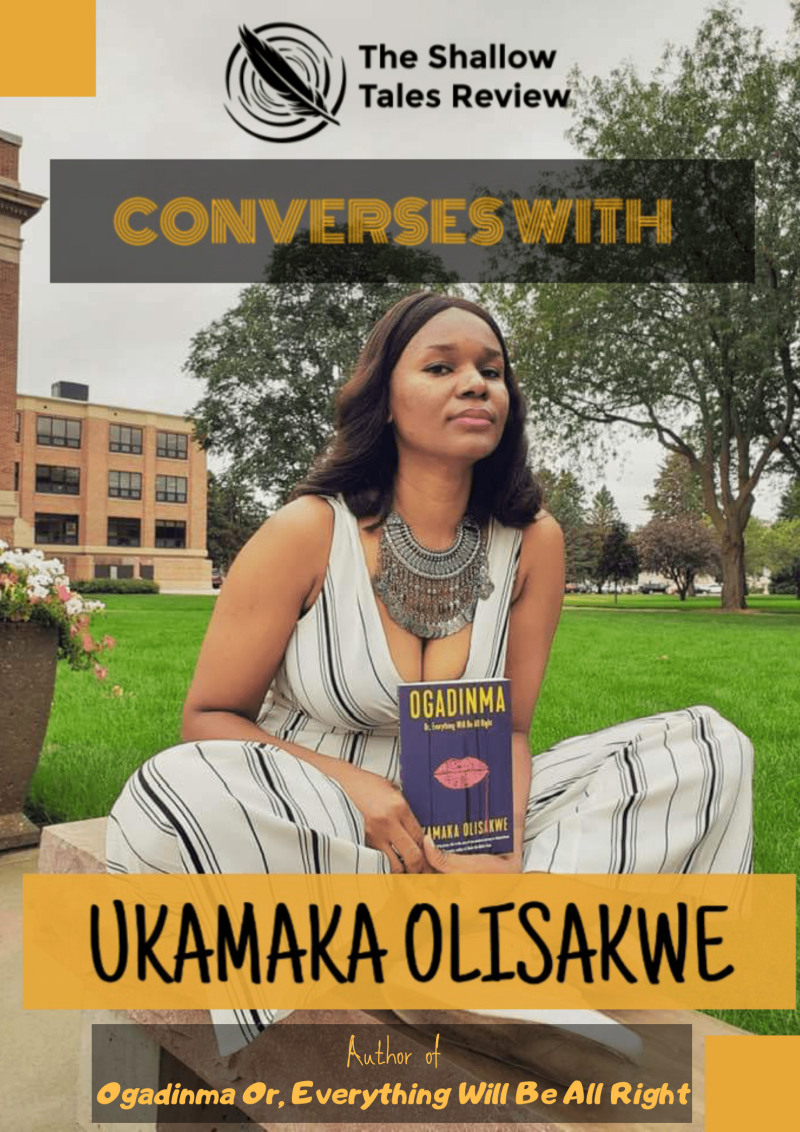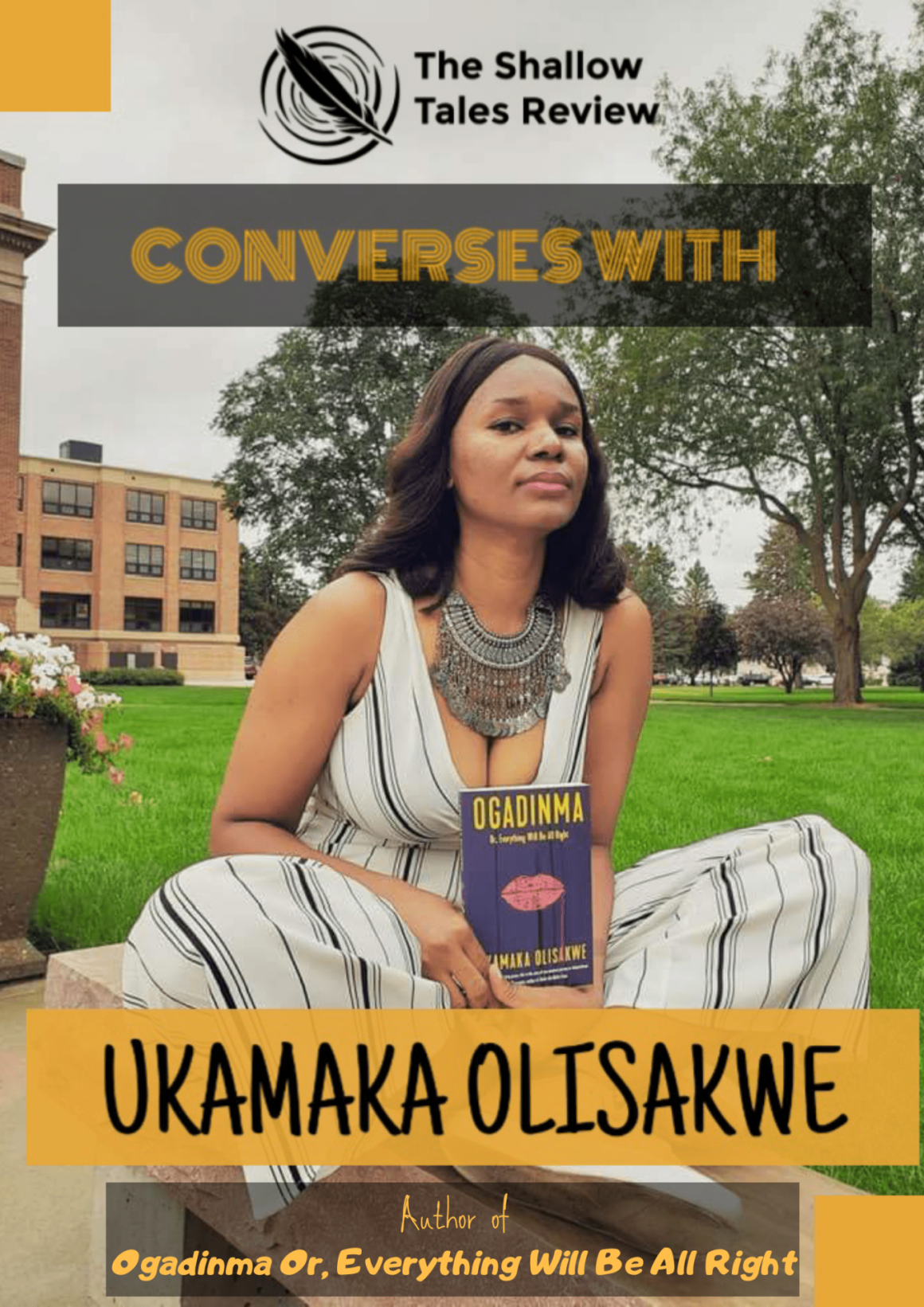
Ukamaka Olisakwe grew up in Kano, Nigeria, and now lives in Vermont.
In 2014, she was named one of the continent’s most promising writers under the age of 40 by the UNESCO World Book Capital for the Africa39 project. In 2016, she was awarded an honorary fellowship in Writing from the International Writing Program at the University of Iowa. In 2018, she won the Vermont College of Fine Arts’ Emerging Writer Scholarship for the MFA in Writing and Publishing program.
Ukamaka, a finalist for the Miles Morland Writing Scholarship, has had her works appear in the New York Times, Granta, Longreads, The Rumpus, Catapult, Rattle, Waxwing, Jalada, Hunger Mountain, Sampsonia Way, and more.
Interviewer: Nzube Nlebedim
In the interview held by the International Writing Program residency of which you were a participant in 2016, you had said that Adichie’s quite controversial speech and essay, “We Should All Be Feminists” was one book that deeply affected you because of the radical exposure it provided on feminism. You have been identified as a feminist writer. What’s your take on feminism in Africa where it is a relatively newer active struggle?
Adichie’s talk was important, necessary. She gave language to the things I had wanted to say—how we stunt out girls’ growth, how patriarchy hurts boys, why it is important to push back against norms that treat the woman as a second-class citizen. Adichie and the women before her, like Buchi Emecheta and Flora Nwapa, centred women in their works. They were all the encouragement I needed to tell my stories.
And I would like to correct one notion: feminism is not new, especially not on the continent. Maybe the word itself found its way lately into the Nigerian vocabulary, but at its core the struggle for the social, political and economic equality of the sexes; ideologies which aren’t any different from what my late grandmothers fought for—is not new.
Are women winning this battle against the toxic patriarchy we have these days?
It depends on what you mean by ‘winning.’ But I would like to point out that many women in my community are no longer afraid to tell their stories; they no longer seek for anyone’s permission before they call out their abusers on social media. They no longer accept bullshit from men, from the society, and the treacherous system that insists on relegating us to the background. Social media is the major win here; it opened new frontiers for women’s rights conversations, and feminists have utilised the digital media to advance ground root political and cultural movements in Nigeria, for example. It is an amazing organizing tool—social media, and I think of it as the revolution the world had been waiting for.
But then, there have been cases where people slander and assassinate characters, saying untruths about others while promoting their causes, and causing problems in the same process. What do you think about this? Don’t you think social media while being a helper is also a problem?
There is a dark side to everything and many things can be true at the same time: social media advanced the feminist cause, gave rise to the historical #MeToo movement and its overspill in Nigeria—like the #ArewaMeToo, founded by Khadijah Adamu, from the city of my birth Kano, who created the hashtag that shook very core Arewa Twitter and cast more light on the things we should always talk about. Social media is also being exploited by some elements who have called out for wrongly accusing people of sexual assault. All of these can be true at the same, and we can have both conversations at the same time. But we should remember not to shade an important movement completely in the wrong light because of the troubles that tagged along its coattails.
In 2014, you were mentioned as one of the 39 sub-Saharan writers below the age of 40 and you were published in the African 39: New Writing from Africa South of the Sahara. What’s the import of this feat to your art?
I needed that pat on the back. I was not so confident about my writing and I needed that validation. It was sort of a confirmation that I was treading the right path. It was a gift and also a challenge, because afterward I began to pay more attention to what I do with language, how I craft my stories.
Congratulations on your just published second novel, first of all. Rob Spillman commented that your newest book, Ogadinma, Or Everything will be All Right is “a stirring, unflinching novel” that cements your status as an “important feminist voice.” Do you agree to this? Do you want to be identified as a feminist novelist?
Of-fucking-course! Ogadinma is a feminist novel written by an unapologetic feminist. Period.
Ogadinma, Or Everything will be All Right examines the conflict between a young woman and her society. What inspired this book?
Ogadinma is my love letter to the women in my life, who were married off to much older men in the 80s, when they were only teenagers. I thought it was important to tell this story because it was an opportunity for me to understand why my aunts didn’t leave their abusive husbands and how society punishes the woman who chooses to walk away from a toxic marriage. It is always so easy to ask why a woman stayed with her abuser. Ogadinma was an education for me; researching it, was a necessary education.
As a Nigerian, what’s your biggest challenge as a writer?
No funding. No structural support. Having to scream “up NEPA” only for the power company to cut power after a few minutes. Having to burn petrol every day just to write. The challenges were many, but my colleagues at home continue to soldier on, and I think they deserve all the accolades. They are powerful, and I cheer them on every opportunity I get.
If you were not a writer, what other path would you have taken?
I would have been a chef, a badass chef.
What’s that one advice you’d give the young writer aspiring for their first novel? What advice would you have given your younger self?
Read, and don’t ever stop. Read across genres. Read non-traditional literatures, like manuals and brochures. You could learn a thing or two; you could attempt a non-traditional story form, like Chikodili Emelumadu did with her exceptional short story, What to do When Your Child Brings Home a Mami Wata.

